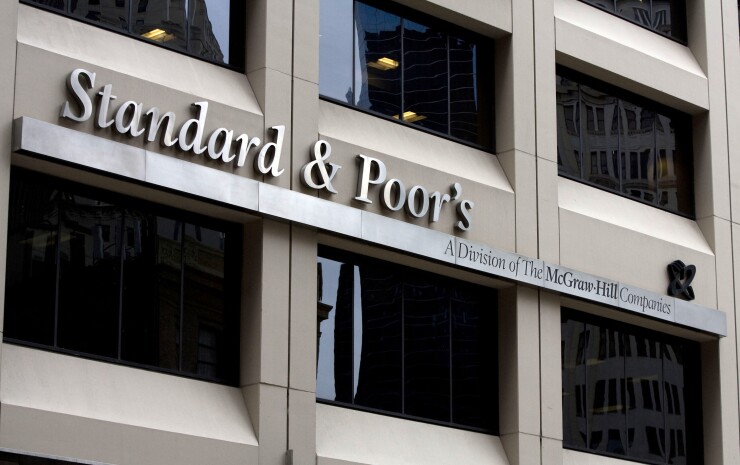The investment-grade ratings of two Indiana cities from S&P Global Ratings are under threat.
S&P socked Plainfield with an eight-notch cut to the lowest investment grade level of BBB-minus from AA-plus earlier this month and also placed it on CreditWatch with negative implications over late debt service payments due to technical issues.
"The downgrade reflects what we see as governance challenges, particularly weak internal controls," that prompted the agency to lower the town’s management rating to very weak from very strong, said S&P analyst Cora Bruemmer. That caps the rating at BBB-minus.

The town said it has taken corrective action that it hopes will stave any further deterioration.
Analysts became aware of three recent late debt service payments after a review of the town’s finances in connection with its latest issuance of ad valorem property tax-secured debt.
“We understand that these payment delays were the result of internal administrative and process issues, and not on account of the town's inability or unwillingness to pay,” S&P said. "In our view, the late payments are an indication of weaknesses in the town's oversight and governance processes.”
"The CreditWatch placement reflects our view that the town still faces some uncertainty on whether the late payments may have triggered cross-default/cross-acceleration clauses in some of its private-placement debt," Bruemmer said. "We expect to resolve this CreditWatch placement within the next 90 days."
Plainfield was late in making its July 2021 debt service payments for its 2017 sewage works refunding revenue bonds, 2018 build-operate transfer obligations, and 2021 general obligation bonds due to an administrative error and employee turnover, the agency said.
The payments were made by the end of the month. Town officials questioned the need for a such deep cut for what was an unintentional administrative error and is taking steps to avoid any further errors.
“We disagree with and are disappointed by S&P’s decision, which was based solely on a one-time unintentional administrative error by the Clerk-Treasurer’s Office,” the town said in a statement. “However, we accept their assessment and have taken immediate action to correct the situation. The Clerk-Treasurer’s Office is already implementing a comprehensive third-party financial audit and a remediation plan that includes multiple checks and balances on all debt bond payments.”
“The town remains on solid financial footing, and the fundamentals of our credit profile remain intact,” the statement read. "We are confident the remediation plan and additional internal controls will alleviate any concerns raised by S&P.”
S&P also cut the town’s sewer rating multiple notches to A from AA-minus and put it on CreditWatch.
Also, Muncie's efforts to restructure privately placed debt has jeopardized its weak investment-grade rating. S&P earlier this month put various Muncie underlying tax-backed ratings on CreditWatch with negative implications after the city disclosed it was pursuing a second restructuring of unrated privately place bonds.
It followed a March disclosure of a draw on debt service reserves. The credits placed on Watch include the city’s general obligation rating, the Delaware Civic Center Authority and other tax-backed credits most of which are rated BBB-minus. The Delaware Civic Center Authority’s lease rental bonds carry a BBB-plus.
“As part of our ongoing surveillance, we were aware of a first restructuring in June 2020,” S&P said in the report announcing the CreditWatch action. “We believe these two subsequent events could weaken our view of the city's creditworthiness, specifically its ability to afford an obligation with its ad valorem tax backing. We are also aware that the city finalized a restructuring of another unrated obligation secured primarily by authority revenues, and a small amount of city revenues.”
The Watch placement — which should be resolved within 90 days — impacts the city’s general obligation ratings and other sales tax and tax-increment financing-backed ratings all at the unenhanced level of BBB-minus. The pledged revenue sources have struggled to meet debt service demands due to the impact of COVID-19.
One of the direct placements that has run into trouble was issued for the Muncie Horizon Center Garage project, a direct placement with Regions Bank. The bank last year reduced the interest rate as various special taxes pledged to repayment fell short due to the pandemic.
The other is the
The bonds are backed by grants, project revenues, and ultimately an ad valorem special revenue tax levied by the Muncie Redevelopment Commission. A draw on reserves was made to cover last month’s debt service payment.
The city





